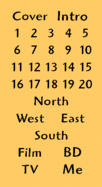© The Artifex Studio for the album sleeve design.
© Andy Latimer/ Decca for the music (excerpt).
© Per A.J. Andersson for the text. Written July 2003, slightly updated November 2011.

Stationary
Traveller
by Camel
| This British rock band has survived for more than thirty years, and still few people ever heard of it. Camel has always played second fiddle - or pan-flute at times – to everyone else. — • — London-area band The Brew had been playing together for years, but a recording contract eluded them. In 1971 they placed an ad for a keyboardist and eventually got Peter Bardens on the hook. Which was no small gain, as he had been involved with the British R&B scene for a decade playing around such people as Van Morrison, Rod Stewart and those about to form Fleetwood Mac. With a new member and a new name – Camel – the group entered the live circuit, slowly building a following. Eventually MCA agreed to sign them for an album release, and 5,000 sold copies later MCA called it a quits. Camel was but one of a horde of progressive outfits on the British rock scene, and they were forgotten amongst the likes of Caravan, Genesis and Wishbone Ash. But they were lucky enough to get signed to the new Gama Records, formed by their booking manager. And in the following years the band was to continue with their style, gaining only marginally in popularity and being classified as a "poor man's version of Pink Floyd". — • — From early on Camel made inroads into the "concept albums" field. In 1975 came "The Snow Goose", a totally instrumental piece inspired by the famous novel by Paul Gallico. After some legal battles with the writer, the album at least gained notoriety for the band. But the era soon belonged to punk rock and new wave. Camel moved away into more light-weight territory and was comparatively successful in doing so for the rest of the decade. Following in the lead of "progressive pop" craftsmen the Alan Parsons Project they had some minor hits on both sides of the Atlantic. But by then Peter Bardens had left the band. Bardens and lead guitarist Andrew Latimer (the latter originally forming The Brew) were at creative odds with each other, so it became clear one had to leave. Eventually the rest of the group sided with Latimer. — • — Andrew Latimer's soft guitar sound was like an elegant yet lightweight version of Pink Floyd's David Gilmour. And as a composer he was into the same kind of music, only less dramatic, more lyrical and dreamy. Starting with "Nude" (1981), Camel was again firmly rooted into progressive music, and a concept album as well, with all the texts written by Susan Hoover (soon to be married to Andrew). She was from now on to be the main lyricist for the band. Beautifully designed concept albums was to be Camel's signum from now on. "Dust and Dreams" deals with the American dust bowl era of the 1930s, "Harbour of Tears" with Irish emigration of the 19th century, "Rajaz" with the world surrounding the camel and the desert. In fact Camel had themselves emigrated. In the middle of the '80s they were out of a recording contract, following their progressive and conceptual heart against diminishing sales. Legal battles with their former manager ensued, and the band – now consisting mainly of Latimer plus hired session musicians – went into a recording hiatus that was to last up until 1991. By now Camel had a new base in California and their own record label. — • — "Stationary Traveller" was the last album before the "hibernation" – and my own personal favourite. It deals with life on both sides in post-war Berlin. Through the album design and photos in black-and-white you get the idea of people trying to live on, building upon the rubbles of a world now turned to ruins. With refugees and Berlin walls among the themes covered in the songs, the feelings of hopelessness and unsecurity comes through very efficiently. And Andrew Latimer's guitar playing is as sharp as ever, making comparisons with Pink Floyd efforts such as "Wish You Were Here" and "A Momentary Lapse of Reason" seem very appropriate. For those of us having heard the album, that is. "Stationary Traveller" was the album that put Camel out of recording contract. And Camel was the progressive rock group that never quite made it. // |
|
STATIONARY
TRAVELLER |
• I Can
See Your House from Here (1979) |

